As the lockdowns of 2020 were entering the second month, I found myself being asked what I believed the pandemic would change about our way of life. A lot has happened in the two years since, and now we are beginning to see how our world has transformed around us.
I’ve been interested in the impacts COVID has had on education specifically. National shutdowns, social distancing, and remote learning affected every single student in this country and beyond. What does that mean for the future graduates of this impacted generation? What are the long-term effects?
According to McKinsey & Company’s research, “The impact of the pandemic on K-12 student learning was significant, leaving students on average five months behind in mathematics and four months behind in reading.…Unless steps are taken to address unfinished learning, today’s students may earn $49,000 to $61,000 less over their lifetime owing to the impact of the pandemic on their schooling.”1 These numbers are even more disconcerting for historically disadvantaged students in low-income communities or in other nations.
In addition to the academic and possibly financial impact, the social and mental health of younger generations has also suffered during this time. Surveys found that during lockdown 55.8% of students in North America had higher levels of anxiety due to the pandemic, and 42.6% of students worried about their futures “most of the time” or “all the time.”.2
Not only have these children and teens grown up in the midst of technology, globalization, and social movements, they’ve also been forced to face a reality that nobody was prepared for at a crucial time in their development.
Kim and I have devoted the next 20 years to building young leaders, and this is an especially crucial time for all Christian leaders to do just that. As we head into the future, we must keep in mind the struggles these young people have faced and have empathy for the ways it has affected them. We must step into the void and become spiritual mentors as these young people grow and join our churches, neighborhoods, and organizations.
It is up to the Church to reach out to the younger generations and disciple them, so they discover their Kingdom identity in God and His Word. We can also make a difference by supporting educational institutions, after-school programs, and mentorship and discipleship initiatives. My hope is that we can instill in this young generation a sense of wholeness and purpose that will enable them to heal and thrive in the days ahead.
1Dorn, Emma, Bryan Hancock, Jimmy Sarakatsannis, and Ellen Viruleg. 2021. “COVID-19 and Education: The Lingering Effects of Unfinished Learning.” McKinsey & Company, July 27, 2021. https://www.mckinsey.com/industries/education/our-insights/covid-19-and-education-the-lingering-effects-of-unfinished-learning.
2Aristovnik, Aleksander et al. 2020 “Impacts of the COVID-19 Pandemic on Life of Higher Education Students: A Global Perspective.” Faculty of Public Administration, University of Ljubljana. October 13, 2020. https://www.mdpi.com/2071-1050/12/20/8438.



